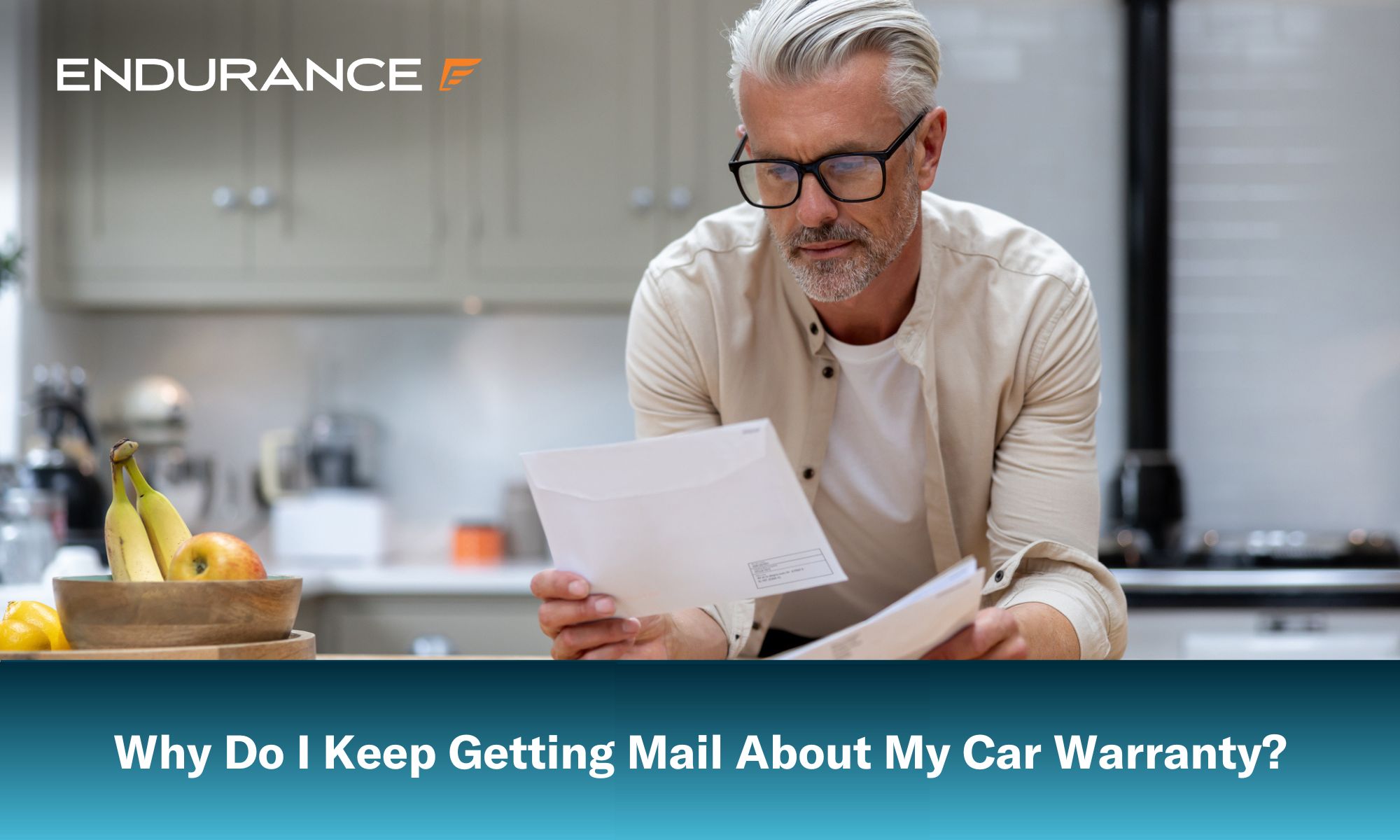Get this deal! Call now.
Speak with a vehicle protection plan specialist and get $300 off any new contract instantly.
Call 866-678-4172
or scan the code below


If you own a car, chances are you’ve received mail about car warranties. These messages come as letters and postcards urging you to buy extended coverage for your vehicle. While you may receive genuine communications from automakers and legitimate warranty companies, these “don’t delay” notifications are another matter. They can be a prelude to a scam.
Explore auto warranty mailers, and we’ll explain what they’re all about, how to spot dubious offers, and make suggestions for protecting your personal information.
Let’s first look at exactly what extended car warranties are. They are also known as auto protection plans or vehicle service contracts (VSCs). In simple terms, an extended warranty protects against breakdowns and repair bills when the manufacturer’s warranty expires. So, if you’ve bought a new car and have had it for several years, or purchased a used car without any warranty, an extended warranty provides peace of mind. The warranty company covers the cost of covered repairs and usually includes extra services like roadside assistance.
VSCs come in many forms. Most extended warranty companies like Endurance offer primary powertrain coverage that protects the engine, transmission, and related components. There are also options for more comprehensive plans that are similar to the bumper-to-bumper new car warranties. Endurance also offers coverage for high-mileage cars, commercial-use motor vehicles, select luxury models, and plans with maintenance services.
Because VSCs provide a valuable service for many car owners, unscrupulous operators seek to exploit this through bogus extended warranties offering sub-par or non-existent coverage.
In today’s world, our personal information is spread everywhere. Companies can purchase your details from information brokers and other firms. Where does this data come from? You.
Most people don’t realize that filling out an online form often includes granting permission for your personal data to be sold to third parties. For instance, if you’ve shopped around for cheaper car insurance using a rate comparison website or app, you’ve shared your address and vehicle information. That’s everything a fishy warranty company needs to contact you by mail.
Your information is gathered in other ways, like from public sources, surveys, contest entries, and even your web browsing history. And car dealerships collect your details as well. A legitimate business will inform consumers what is done with their personal information (a privacy policy), but often this includes implied consent to sell these details to third parties.
There is no uniform national law governing how companies handle personal data. Conditions vary by the type of data (financial or medical, for instance) and by state regulation. For a detailed look at the patchwork of data privacy laws from the Federal Communications Commission (FCC) and other regulators, read about it in The New York Times.
When it comes to car dealers, they have their own set of data privacy rules that must be followed, particularly if it involves financing. You can review here all that’s required by the U.S. Federal Trade Commission (FTC). Generally, a dealer has to inform car buyers about what it does with this information.
However, there are exceptions, such as when you receive promotional mailings about dealer service specials that an outside marketing agency may handle. Usually, if you receive a privacy policy notice, you’ll have an opportunity to opt out of the information being shared. However, there are some exclusions, such as providing your personal information to an automaker or finance company.
We’ll review how to increase personal data protection in a separate section below.
Savvy marketers for disreputable warranty companies are very good at sending mail that looks official. It’s a ploy to get you to respond and sign up for coverage that can leave you disappointed and ripped off. Here are some warning signs of a scam warranty mailing

There are many legitimate car warranty companies, so you may receive mail from one or come across an online offer. Here’s how to tell who to do business with and who to run away from.
Preventing scam warranty sales pitches begins with controlling your personal information. Whenever possible, review the privacy policy for every company you provide with personally identifiable details and opt out of information-sharing requests. This won’t completely eliminate the problem, but it will help significantly. Here are some other steps to consider.
Additionally, contact your state’s consumer affairs agency to see if there are any additional privacy rights where you live.
Before pulling the trigger on any extended car warranty, use these measures to ensure you’re dealing with a reputable company. This will ensure you know exactly the type of coverage you’re buying.
Let’s face it. There are many extended warranty providers to choose from. Yet, thousands of car owners choose Endurance each year for its transparency and openness.
To begin with, Endurance complies with all applicable state regulations, including meeting rigorous licensing requirements and verifying good financial standing. In addition, unlike other companies, Endurance has taken the extra step of being certified to offer auto protection plans in California (called mechanical breakdown insurance in the Golden State). This extra effort is an achievement many competitors can’t claim.
Endurance stands out in other ways. It is the largest direct-to-consumer provider of auto protection plans in the U.S. That means when a breakdown occurs, you’re dealing with dedicated Endurance team members throughout the claims process, not third-party administrators like other companies. It’s an approach designed to get you back on the road as soon as possible without the hassle. Endurance’s numerous awards validate that it delivers on its promises.
Endurance is more than solid coverage and kind words. Since 2012, the company has paid over $287 million in claims. That’s money not spent by plan holders on repairs and related expenses. In addition, Endurance is backed by an A.M. Best “A-” rated insurance company.
No matter which Endurance vehicle protection plan you choose, every option includes 24/7 roadside assistance, trip-interruption protection, rental car reimbursement, a 30-day money-back guarantee, and flexible payment terms. In addition, plan holders can choose from any ASE Certified mechanic for repairs.
Endurance customers also have access to Elite Benefits. A small activation fee provides a free year of worthwhile services (a $2,000 value), such as tire repairs and replacements, collision repair discounts, and key fob replacement.
Discover all the advantages of an Endurance extended warranty! Get a free online quote by calling (800) 253-8203 or shop online for coverage. To learn about car care, DIY maintenance, vehicle reviews, and more, check out the Endurance blog for expert articles and guides.

We're here to make sure you get the most comprehensive EV protection. That's why we've partnered with Xcelerate Auto to offer you transparent and dependable Tesla coverage.
Want us to contact you about XCare coverage for your Tesla?



Call for $300 off any new plan!
By clicking the button, you consent to Endurance using automated technology to call, email, and text you using the contact info above, including your wireless number, if provided, regarding auto protection or, in California, mechanical breakdown insurance. You also agree to the Endurance Privacy Policy and Terms and Conditions. Consent is not a condition of purchase, and you can withdraw consent at any time. Message and data rates may apply.
Speak with a vehicle protection plan specialist and get $300 off any new contract instantly.
Call 866-678-4172
or scan the code below



Simply fill out the information below and we will follow up fast with your free no-obligation quote.
By clicking the button, you consent to Endurance using automated technology to call, email, and text you using the contact info above, including your wireless number, if provided, regarding auto protection or, in California, mechanical breakdown insurance. You also agree to the Endurance Privacy Policy and Terms and Conditions. Consent is not a condition of purchase, and you can withdraw consent at any time. Message and data rates may apply.

To speak to a vehicle protection plan specialist and save $300
Scan the code below
After more than 16 years as a technician and service advisor, Adam Karner transitioned to the auto protection industry in 2009. As a Product Manager for Endurance Dealer Services, he brings valuable hands-on experience. Read more about Adam.